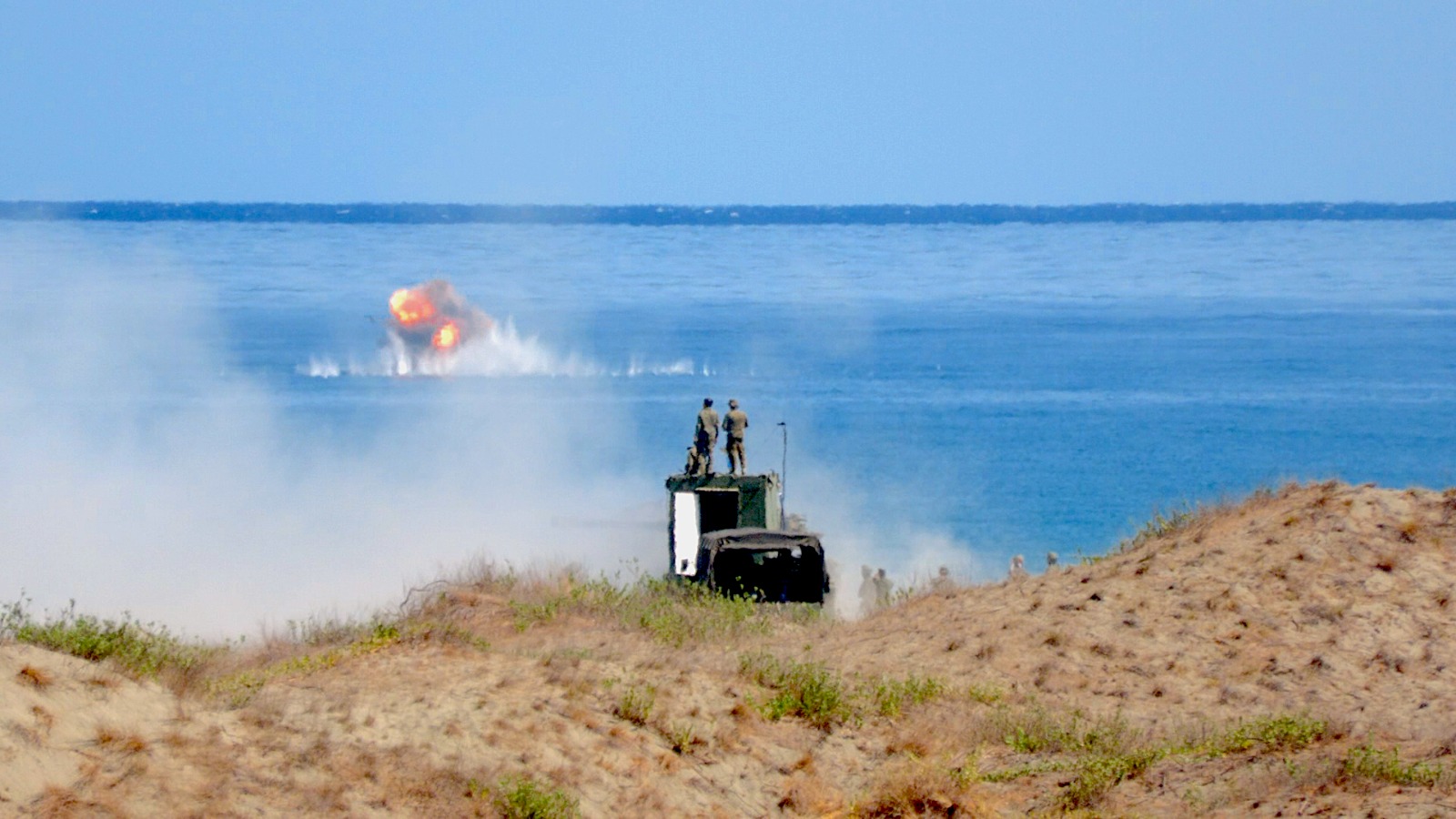
Philippine military’s Autonomous Truck Mounted Howitzer System (ATMOS) 155mm self-propelled gun system hit a floating target during the live fire drills in Laoag City, Ilocos Norte on Monday, May 6, 2024, as part of Balikatan exercises. INQUIRER.net/Ryan Leagogo
LAOAG City, Philippines — Manila and Washington simulated on Monday the foiling of an invasion attempt of a foreign country in the shores of Ilocos Norte, the Philippines’ northernmost mainland province near Taiwan, in the penultimate event of the biggest annual bilateral exercise in the country.
Notwithstanding the projected dangerous heat index here, some 200 personnel from both countries conducted live fire exercises at the La Paz Sand Dunes using the US marine’s Autonomous Truck Mounted Howitzer System (ATMOS) 155mm self-propelled guns and the Philippine military’s M101 105mm towed howitzers.
These assets were used to sink five floating targets, serving as mock amphibious assault vehicles that were to be prevented from reaching the shores.
READ: PH, US to hold military drills in islands facing South China Sea, Taiwan
Thin curls of black smoke arose, and loud booms were heard as these assets tackled the stationary targets with a direct hit, causing them to submerge.
Serving as the final line of defense, marine troops of both countries were also deployed on the shorelines, laying down fire to repel what was left from the mock adversary force.
“They were sweaty and hot, but with big smiles on their faces; they are fighting with a happy heart,” Lt. Gen. Michael Cederholm, commanding general of the 1 Marine Expeditionary Force, said of the marine troops in a chance interview after the live-fire drills.
On May 8, the former BRP Lake Caliraya—a discarded “made in China” oil tanker—will be used as a mock target during Manila and Washington’s sinking exercise in the same town facing the West Philippine Sea. This exercise, which will run until May 10, will serve as the highlight of the 16,000-strong Balikatan exercise.
READ: Philippines, US plan mock enemy ship sinking near Taiwan
Not about any ‘third party’
The conduct of such drills in relatively close proximity to Taiwan did not sit well with China, which deemed the activities as “provocations.”
READ: ‘Made in China’ ship as mock target in Balikatan unintentional—PH Navy
Taiwan is a self-ruled island nation seen by Beijing as a renegade province subject to reunification.
“We don’t do this for any third party,” Cederholm said when asked if this activity was done in view of the Taiwan scenario. “We don’t do this for messaging.”
Instead, Cederholm said the drills were done in the area because it is the “perfect” training ground to bolster the interoperability of both countries.
US and Philippine Marines fire M198 155mm Howitzer artillery during a live fire exercise against an imaginary “invasion” force as part of the joint US-Philippines annual military Balikatan drills on a strip of sand dunes in Laoag on Luzon island’s northwest coast on May 6, 2024. US and Filipino troops fired missiles and artillery at an imaginary “invasion” force during war games on the Philippines’ northern coast on May 6, days after their governments objected to China’s “dangerous” actions in regional waters. Agence France-Presse
“The location was just perfect for the interoperability we wanted to test, the sea control we wanted to do and securing and defending key maritime terrains,” he said.
Aside from the sinking exercise, which will be done for the second time this Balikatan, America’s newest ground-based missile has also been deployed here in Laoag, and its mobilization and deployment were studied during the drills. However, there were no live fire drills for the Typhon Mid-Range Capability missile system.
“There were improvements now compared to last year,” said Maj. Gen. Marcin Licudine, Balikatan 2024 exercise director.
Licudine added: “Without the training, expertise, and specialization that we gain in the training, we cannot perform effectively or efficiently.”
Mutual Defense Treaty
Cederholm, meanwhile, noted that the developments in the drills are the “logical” trajectory of the Mutual Defense Treaty (MDT), which, he also said, is geared to prepare for the worst-case scenario in the Indo-Pacific.
“When we prepare for the worst, what I think we’ve seen in this Balikatan, and I’m excited that we’ll continue to refine, is securing the key maritime terrain, either taking it or defending it,” Cederholm said.
Signed on August 30, 1951, the MDT states that Manila and Washington would support each other if one of them faces an external attack.
“We’re always ready,” he said, “and we train every day to be ready.”
First posted 11:40 am